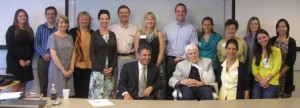 I just got back from a three-day workshop at the Beck Institute in Philadelphia on Teaching and Supervising Staff in Cognitive Behavior Therapy. While the content of the workshop will help me improve the CBT staff training program at the CBT Center, the most invigorating part of the workshop was the opportunity to learn from the other participants. There were about 50 professors and expert CBT practitioners at this workshop from all around the world, including China, India, Japan, South Africa and Great Britain.
I just got back from a three-day workshop at the Beck Institute in Philadelphia on Teaching and Supervising Staff in Cognitive Behavior Therapy. While the content of the workshop will help me improve the CBT staff training program at the CBT Center, the most invigorating part of the workshop was the opportunity to learn from the other participants. There were about 50 professors and expert CBT practitioners at this workshop from all around the world, including China, India, Japan, South Africa and Great Britain.
I felt like I was “home” in a group of people who were just as excited about CBT as me and the life-changing impact CBT offers to our clients. Sitting there, I realized that these 50 people – me included – will be impacting thousands of lives, not only through our direct client care but, more importantly, by training other therapists in CBT. There continues to be a deficit in well-trained CBT therapists who actually practice evidence-based CBT and offer scientifically-based psychotherapy to their clients. The Beck Institute is going to develop a list serve and other ways for our group to stay connected over time. This was a pleasant surprise of attending the workshop. In addition, I made a few new friends with whom I hope to keep in touch.
By far, the highlight of the workshop was the opportunity to spend two hours with Dr. Aaron Beck. For a CBT therapist, this is like having a meeting with Freud. Dr. Beck is credited as the father of cognitive behavior therapy and has done more than any other single individual to disseminate evidence-based therapy. Dr. Beck talked to us about the past and future of CBT. He said in the early days of CBT, he felt very lonely since other schools of psychotherapy were rejecting of CBT. He said talking to his teenage daughter, Judy, inspired him to go on with his research. By the way, Judy is now the leader of the Beck Institute and will carry on Dr. Beck’s work for the next generation.
Dr. Beck said, in the the future, he believes there will be one broad unifying theory of psychopathology but he still thinks there will be a variety of evidence-based treatments for different problems since different strategies need to be emphasized for different problems and client styles. He said therapists should base interventions on the overall psychological conceptualization of the individual client and then consider evidence-based strategies for specific disorders. Techniques need to be adapted to the case formulation and to patient’s learning capabilities. He told us to not be technique driven or beat a technique to death but, rather, have some variety in our treatment approaches and suit them to the client’s needs.
I feel like I am coming back from a spiritual journey to Mecca or Lourdes or the Holy Land. Every time I go to the Beck Institute, I am re-inspired for the work I do everyday with my clients and the staff at the CBT Center of Silicon Valley.
